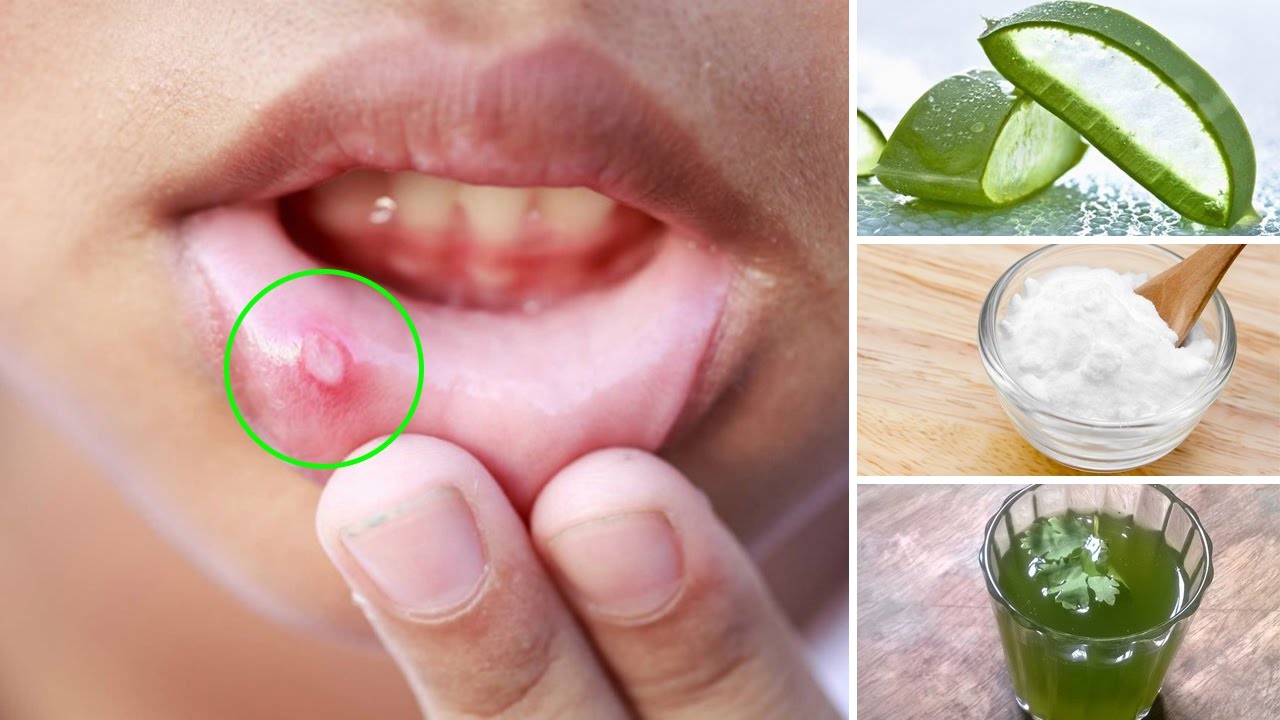How to Get Rid of a Canker Sore Naturally at Home
Canker sores are oral conditions that are both painful and unsightly. Women are more likely to get them than men. It is important to note that these ulcers that form in and around the mouth are not contagious and are not related to cold sores, which they are often confused with.
Some of the contributing factors to canker sores are injuries to the mouth, stress, smoking, hormonal changes, anemia, allergies and viral infections. These sores can cause burning, fevers, pain and swollen lymph nodes.
Today’s video will discuss natural ways to treat canker sores.
1. Coriander
Coriander contains anti-inflammatory and anti-fungal properties. As such, it is a perfect tool for handling canker sores. There are several different ways that coriander can be used.
Coriander leaves can be boiled in a glass of water and then strained. Once cooled, gargle with this solution three or four times each day.
Coriander seeds can also be used by simply adding one teaspoon of seeds to one cup of boiling water. Allow the solution to sit and steep for several minutes and then strain. Use the solution to gargle with three to four times each day.
The juice from coriander leaves can also be consumed. Take the juice from the leaves, hold it in the mouth to allow the liquid to sit on the sore, and then drink.
2. Aloe Vera
Aloe Vera can help to speed up the healing process, while fighting germs and viruses. Simply open an aloe Vera leaf and take out the gel. Then, place the gel directly onto the canker sore. Aloe Vera juice can also be used to gargle with several times each day. Aloe Vera gel can also be consumed, two tablespoons, two to three times each day.
3. Salt
Salt can help to remove fluid and infection from the sore, thus quickening the healing process. This can be done by mixing one teaspoon of salt into one cup of lukewarm water. Then, by using this solution to rinse the mouth out, for at least thirty seconds. Once rinsed, salt can be placed directly into the canker sore.
4. Honey
Honey can also be placed in and around the sore to clean out germs and speed up the healing. This may sting initially; however, the pain will soon subside. Repeat this several times each day. A paste can also be made of one teaspoon of honey and one quarter of a teaspoon of turmeric powder.
5. Sage
Sage is a spice that is effective in calming canker sores and relieving any pain and inflammation. Add three teaspoons of sage to two cups of boiling water. Allow the leaves to sit and steep for about ten to fifteen minutes. After the solution cools, use it to rinse your mouth several times each day.
6. Baking Soda
Baking soda has the ability to clean out the sores and relief pain and inflammation. Simple add a little water to one teaspoon of baking soda to make a paste that is to be placed directly onto the canker sore. Let the paste sit on the sore for a few minutes and then rinse well. Repeat this three to four times each day until the sore has disappeared.
7. Cayenne Pepper
The spiciness in cayenne pepper comes from the chemical capsaicin, which numbs the nerves in the body. This is extremely helpful in relieving pain and discomfort. Simply take a small amount of cayenne pepper and mix with a little water. This will create a paste to place directly on the sore. After the initial discomfort, pain and inflammation will soon dissipate. Repeat this twice each day.
8. Tea Tree Oil
Tea tree oil has antiseptic properties that help to clear the skin of canker sores and to prevent them from appearing. Simply add ten drops of tea tree oil to a glass of water. Then, use this solution to rinse out the mouth, three to four times daily.
Do you, or someone you know, suffer from canker sores? Have you heard of these natural remedies? If you have, have you found relief from them? Let us know in our comment section.
Disclaimer: The materials and the information contained on Natural Cures channel are provided for general and educational purposes only and do not constitute any legal, medical or other professional advice on any subject matter. These statements have not been evaluated by the FDA and are not intended to diagnose, treat or cure any disease. Always seek the advice of your physician or other qualified health provider prior to starting any new diet or treatment and with any questions you may have regarding a medical condition. If you have or suspect that you have a medical problem, promptly contact your health care provider.
Images licensed under CC:
www.pixabay.com
www.flickr.com
www.pexels.com
en.wikipedia.org
commons.wikimedia.org
www.publicdomainpictures.net
For more information and references, check the article on our blog:
https://www.naturalcures.me



![[ID: Hx_A0iLhdr8] Youtube Automatic](https://bizimtube.com/wp-content/uploads/2021/03/id-hxa0ilhdr8-youtube-automatic-236x133.jpg)
![[ID: lp7w0UmpuIs] Youtube Automatic](https://bizimtube.com/wp-content/uploads/2021/03/id-lp7w0umpuis-youtube-automatic-236x133.jpg)
![[ID: s2-7T1TH-lY] Youtube Automatic](https://bizimtube.com/wp-content/uploads/2021/03/id-s2-7t1th-ly-youtube-automatic-236x133.jpg)
![[ID: b_lakC9M4UQ] Youtube Automatic](https://bizimtube.com/wp-content/uploads/2021/03/id-blakc9m4uq-youtube-automatic-236x133.jpg)
![[ID: r44yl6nPONs] Youtube Automatic](https://bizimtube.com/wp-content/uploads/2021/03/id-r44yl6npons-youtube-automatic-236x133.jpg)
![[ID: pAwto1YQjA8] Youtube Automatic](https://bizimtube.com/wp-content/uploads/2021/03/id-pawto1yqja8-youtube-automatic-236x133.jpg)
![[ID: XETG8azHiv4] Youtube Automatic](https://bizimtube.com/wp-content/uploads/2021/03/id-xetg8azhiv4-youtube-automatic-236x133.jpg)
![[ID: f3G_-S_2HUk] Youtube Automatic](https://bizimtube.com/wp-content/uploads/2021/03/id-f3g-s2huk-youtube-automatic-236x133.jpg)
![[ID: G8oWns54snA] Youtube Automatic](https://bizimtube.com/wp-content/uploads/2021/03/id-g8owns54sna-youtube-automatic-236x133.jpg)
![[ID: s0lIFXhu6aw] Youtube Automatic](https://bizimtube.com/wp-content/uploads/2021/03/id-s0lifxhu6aw-youtube-automatic-236x133.jpg)
![[ID: 4UTd2Ev8eYg] Youtube Automatic](https://bizimtube.com/wp-content/uploads/2021/03/id-4utd2ev8eyg-youtube-automatic-236x133.jpg)
![[ID: RKBGBjVJBxQ] Youtube Automatic](https://bizimtube.com/wp-content/uploads/2021/03/id-rkbgbjvjbxq-youtube-automatic-236x133.jpg)